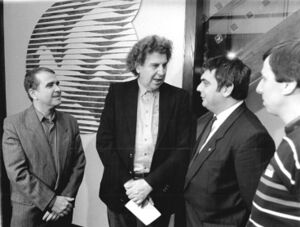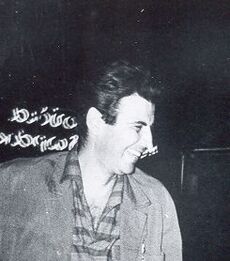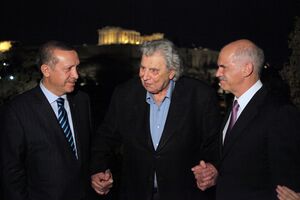ميكيس ثيودوراكيس
| ميكيس ثيودوراكيس | |
|---|---|
 ميكيس ثيودوراكيس في 2004 | |
| معلومات عن الخلفية | |
| وُلـِد | 29 يوليو 1925 خيوس، اليونان |
| الأصناف | الموسيقى الكلاسيكية في القرن 20 |
| سنوات النشاط | 1943–الحاضر |
| العناوين |
|
| الموقع الإلكتروني | www |
ميخائيل "ميكس" ثيودوراكيس (باليونانية: Μιχαήλ (Μίκης) Θεοδωράκης [ˈmicis θeoðoˈɾacis]، إنگليزية: Mikis Theodorakis}؛_و. 29 يوليو 1925)، هو ملحن وشاعر غنائي يوناني ساهم في الموسيقى اليونانية المعاصرة بأكثر من 1000 عمل.[1][2][3][4][5]
قام بتأليف الموسيقى التصويرية لأفلام زوربا اليوناني (1964)، زد (1969)، وسرپيكو (1975). لحن ثلاثية ماوتهاوزن، التي تُعرف أيضاً باسم "أغنية ماوتهاوزن"، الذي وُصف بأنها "أجمل عمل موسيقي كتب على الإطلاق عن الهولوكوست" وربما أفضل أعماله.[6] ويعتبر أشهر موسيقي يوناني على قيد الحياة.[2][4][7] حاز ثيودوراكيس جائزة لنين للسلام.[8]
سياسياً، يرتبط ثيودوراكيس باليسار بسبب علاقاته الطويلة الأمد مع الحزب الشيوعي اليوناني. كان نائباً عن الحزب من عام 1981 إلى عام 1990. ومع ذلك، في عام 1989 ترشح كمستقل داخل حزب يمين الوسط الديمقراطية الجديدة، من أجل الخروج من الأزمة السياسية التي نشأت بسبب الفضائح العديدة لحكومة أندرياس پاپاندريو، [9] وساعد في تأسيس تحالف كبير بين المحافظين والاشتراكيين واليساريين. في عام 1990 انتخب نائباً (كما في 1964 و1981)، وأصبح وزيراً في الحكومة في عهد قسطنطينوس ميتسوتاكيس، وحارب المخدرات والإرهاب ومن أجل الثقافة والتعليم وتحسين العلاقات بين اليونان وتركيا. واصل التحدث لصالح القضايا اليسارية والعلاقات اليونانية - التركية - القبرصية، وضد الحرب في العراق.[10][11] عارض باستمرار الأنظمة القمعية وكان صوتًا رئيسيًا ضد 1967-1974 الطغمة العسكرية اليونانية، الذي سجنه وحظر أغانيه.[12]
. . . . . . . . . . . . . . . . . . . . . . . . . . . . . . . . . . . . . . . . . . . . . . . . . . . . . . . . . . . . . . . . . . . . . . . . . . . . . . . . . . . . . . . . . . . . . . . . . . . . . . . . . . . . . . . . . . . . . . . . . . . . . . . . . . . . . . . . . . . . . . . . . . . . . . . . . . . . . . . . . . . . . . . .
سيرته
السنوات المبكرة
ولد ميكيس ثيودوراكيس في جزيرة خيوس اليونانية وقضى سنوات طفولته في مدن يونانية إقليمية مختلفة مثل ميتيليني،[13] كفالونيا،[13] پاتراس،[14][15] [[پيرگوس، إيليس |پيرگوس]]،[16][17] وتريپولي.[17][18]والده محام وموظف حكومي من قرية كاتو گالاتاس الصغيرة.[19][20]في جزيرة كريت ووالدته أسپاسيا پولاكيس من عائلة يونانية عرقية في تششمه، في ما يعرف اليوم تركيا.[7][21][22][23][24]نشأ على الموسيقى الشعبية اليونانية وتأثر بـ الليتورجيا البيزنطية؛ وقد قال عندما كان طفلاً أنه سيصبح ملحناً.[25][26]
بدأ شغفه بالموسيقى في بدايه طفولته. علم نفسه أن يكتب أغانيه الأولى دون استخدام الآلات الموسيقية. وقد أخذ دروس الموسيقى الأولى في پاتراس[14] وپيرگوس،[16] حيث كان صديق طفولة لـ جورج پاڤلوپولوس،[27] وفي تريپولي، پلوپونيز،[18] قدم أول حفل موسيقي له في سن السابعة عشرة. ذهب إلى أثينا عام 1943 ، وأصبح عضوًا في وحدة الاحتياط ELAS، وقاد فرقة في القتال ضد اليمين البريطاني واليوناني في أحداث ديسمبر.[28] خلال الحرب الأهلية اليونانية تم اعتقاله وإرساله إلى المنفى في جزيرة إيكاريا[29] ثم تم نفيه إلى جزيرة ماكرونيسوس، حيث تعرض للتعذيب ودُفن حياً مرتين.[30]
خلال الفترات التي لم يكن ملزماً فيها بالاختباء أو النفي أو السجن، درس من عام 1943 إلى عام 1950 في معهد أثينا الموسيقي تحت إشراف فيلوكتيتيس إيكونوميديس.[31]في عام 1950 أنهى دراسته وأجرى الاختبارين الأخيرين له "with flying colours".[32]ذهب إلى كريت، حيث أصبح "رئيس مدرسة خانيا للموسيقى" وأسس أول أوركسترا له.[33] ففي هذا الوقت أنهى ما أسماه "الفترة الأولى" من كتاباته الموسيقية.[بحاجة لمصدر]
دراسته في پاريس
في عام 1953، تزوج ثيودوراكيس من ميرتو ألتينوگلو.[34]في العام التالي، سافرا إلى باريس، حيث دخل المعهد الموسيقي ودرس التحليل الموسيقي تحت إشراف أوليڤييه ميسيان[35] وباشر بإشراف يوجين بيگو.[36]بالفترة التي قضاها في باريس، 1954-1959، "الفترة الثانية" للكتابة الموسيقية.
أعماله السمفونية: كونشيرتو البيانو، وأول مجموعة موسيقية، وأول سيمفونية، وعلاماته لـ الباليه: كرنفال يوناني، Le Feu aux Poudres, Les Amants de Teruel التي نالت إشادة دولية. في عام 1957، نال الوسام الذهبي في مهرجان الموسيقى في موسكو. كان رئيس لجنة التحكيم ديمتري شوستاكوڤيتش. في عام 1959، بعد العروض الناجحة لباليه ثيودوراكيس Antigone في كوڤنت گاردن في لندن، اقترحه الملحن الفرنسي داريوس ميلود للحصول على جائزة American Copley Music Prize - وهي جائزة من مؤسسة "وليلم ونوما كوپليه "،[37] والتي غيرت اسمها لاحقاً إلى "مؤسسة كاساندرا" باعتبارها "أفضل ملحن أوروبي لهذا العام". أول تسجيلاته العالمية للفيلم Ill Met by Moonlight و Luna de Miel، إخراج: مايكل پاول و إمرك پرسبرگر، والذي نجح فيهما: أصبحت أغنية عنوان Honeymoon جزءًا من مجموعة بيتلز.
الأعمال المشهورة حتى 1960
- Chamber Music: Four String Quartets; Trio four piano, violin, cello; Little Suite for piano; Sonatina for piano; Sonatinas No.1 and No.2 for violin and piano;
- Symphonic music: Assi-Gonia (symphonic movement; Piano Concerto "Helicon"; Symphony No.1 (Proti Simfonia); Suites n° 1, 2 et 3 for orchestre; La Vie et la Mort / Live and Death (for voice and strings); Œdipus Tyrannos (for strings; later for quartet and symphony orchestra); Piano Concerto;
- Ballets: Greek Carnival; Le Feu aux Poudres; Les Amants de Teruel; Antigone;
- Filmscores: The Barefoot Battalion (Greg Tallas); Ill Met by Moonlight and Honeymoon (Powell and Pressburger); Faces in the Dark (David Eady).
العودة لجذوره اليونانية
أعماله الرئيسية في تلك الفترة
- مجموعة الأغاني: Epitaphios (Yannis Ritsos); Archipelagos (Songs of the Islands), Politia A & B (Songs of the City), Epiphania (Giorgos Seferis, Nobel Prize 1963), Mikres Kyklades (Odysseas Elytis), Chrysoprasino Fyllo (Golden-green leaf), Mauthausen (Iakovos Kambanellis), Romiossini (Yannis Ritsos), Thalassina Feggaria (Moons of the Sea)
- الموسيقى الدينية: To Axion Esti[38] (Odysseas Elytis, Nobel Prize 1979), cf. Theodorakis on Axion Esti[39]
- موسيقى المسرح: The Hostage (Brendan Behan); Ballad of the Dead Brother (Theodorakis); Omorphi Poli (Beautiful City); Maghiki Poli (Magical City); I Gitonia ton Angelon(The Angels' Quarter, Iakovos Kambanellis)
- مجموعة تسجيلات للأفلام: Phaedra (Jules Dassin), The Lovers of Teruel (Raymond Rouleau), Five Miles to Midnight (Anatole Litvak), إلكترا and زوربا اليوناني (Michalis Cacoyannis), To Nisi tis Afroditis (Harilaos Papadopoulos)
- "ثلاثية ماوتهاوزن" المعروفة أيضاً باسم "The Ballad of Mauthausen"، سلسلة من الأغاني مع كلمات مستوحاة من قصائد كتبها الشاعر اليوناني إياكوڤوس كامبانيليس. وقد وُصِف بأنه "أجمل عمل موسيقي كتب على الإطلاق عن الهولوكوست" وبأنه "لحن رائع ومثير للعاطفة ينقل كلمات كامبانيلس المؤثرة إلى مستوى أعلى". كما تم وصفه بأنه ربما أفضل عمل لثيودوراكيس.[6][40]
أثناء النظام الدكتاتوري
أعماله تحت الحكم الدكتاتوري
- مجموعة الأغاني: Ta Laïka (The Popular Songs, Manos Elefteriou);[41] O Ilios ke o Chronos (Sun and Time, Theodorakis); Songs for Andreas (Theodorakis); Arcadies I-X; Nichta Thanatou (Nights of Death, Manos Elefteriou);
- الموسيقى الدينية: Ephiphania Averoff Giorgos Seferis, State of Siege (Marina = Rena Hadjidakis), March of the Spirit (Angelos Sikelianos), Raven (Giorgos Seferis, after Edgar Allan Poe);
- مجموعة تسجيلات للأفلام: Z (Costa-Gavras).
المقاومة في المنفى
أثناء وجوده في المنفى، حارب ثيودوراكيس خلال أربع سنوات من أجل الإطاحة بالعقيد. بدأ جولاته العالمية وأقام مئات الحفلات الموسيقية في جميع القارات كجزء من كفاحه من أجل استعادة الديمقراطية في اليونان.
وقد التقى پابلو نرودا و سلڤادور ألندى ووعدهما بتأليف نسخته من كانتو جنرال. استقبله جمال عبد الناصر و تيتو ،إيگال آلون و ياسر عرفات، في حين أصبح فرانسوا ميتران،[42]أصبح أولوف پالمه و ڤيلي برانت أصدقاءه. بالنسبة لملايين الناس، كان ثيودوراكيس رمزاً للمقاومة ضد الديكتاتورية اليونانية.[43]
. . . . . . . . . . . . . . . . . . . . . . . . . . . . . . . . . . . . . . . . . . . . . . . . . . . . . . . . . . . . . . . . . . . . . . . . . . . . . . . . . . . . . . . . . . . . . . . . . . . . . . . . . . . . . . . . . . . . . . . . . . . . . . . . . . . . . . . . . . . . . . . . . . . . . . . . . . . . . . . . . . . . . . . .
أعمال رئيسية التي كتبها في المنفى
- مجموعات الأغاني: 18 lianotragouda tis pikris patridas (18 Short Songs of the Bitter Land, Yiannis Ritsos), Ballades (Manolis Anagnostakis), Tis exorias (Songs of the Exile)
- الموسيقى الدينية: Canto General, Sections 3 to 6 only (Pablo Neruda)
- مجموعة تسجيلات الأغاني: The Trojan Women (M. Cacoyannis); State of Siege (Costa-Gavras); Serpico (Sidney Lumet)
العودة لليونان

الأعمال الرئيسية بعد 1974
- مجموعات الأغاني: Ta Lyrika; Dionysos; Phaedra; Beatrice in Zero Street; Radar; Chairetismoi (Greetings); Mia Thalassa (A Sea Full of Music); Os archaios Anemos (Like an Ancient Wind); Lyrikotera (The More-Than-Lyric Songs); Lyrikotata (The Most Lyric Songs); Erimia (Solitude); Odysseia;
- موسيقى المسرح: Orestia (dir.: Spyros Evangelatos); Antigone (dir.: Minos Volanakis); Medea (dir.: Spyros Evangelatos)
- مجموعة تسجيلات الأفلام: Iphigenia (M. Cacoyannis), The Man with the Carnation (Nikos Tzimas)
- الموسيقى الدينية: Canto General in 13 Sections, completed in 1981 (Pablo Neruda)
- Oratorios: Liturgia 2; Missa Greca (Thia Liturgia); Requiem;
- الموسيقى السمفونية والمقطوعات القصيرة: Symphonies no 2, 3, 4, 7; According to the Sadducees; Canto Olympico; Guitar Rhapsody; Cello Rhapsody; Trumpet Rhapsody (dedicated to Otto Sauter, 2008); Rhysody for Strings (Mezzo-Sopran or Baryton ad lib.)
- الأوپرا: "The Metamorphosis of the Dionysus" (Kostas Karyotakis); Medea; Elektra; Antigone; Lysistrata.
آراؤه السياسية
إسرائيل واليهود
تحدث ثيودوراكيس ضد حرب العراق واحتلال إسرائيل لغزة والضفة الغربية. وأدان رئيس الوزراء اليوناني جورج پاپاندريو لإقامته علاقات أوثق مع رئيس الوزراء الإسرائيلي بنيامين نتانياهو، الذي قال إنه مذنب بارتكاب "جرائم حرب في لبنان وغزة."[44] ثيودوراكيس هو أيضاً ناقد صريح للصهيونية، ويشير إلى نفسه على أنه "مناهض للصهيونية.”[45][46][47][48]في عام 2003، صرح بأن "كل ما يحدث اليوم في العالم له علاقة بالصهاينة ... اليهود الأمريكيون هم وراء الأزمة الاقتصادية العالمية التي عصفت باليونان أيضاً". ووصف نفسه بأنه "معاد لإسرائيل ومعاد للسامية" لأن "هذه الأمة الصغيرة (إسرائيل) هي أصل الشر"..[49] اعتذر ثيودوراكيس لاحقاً عن التعليقات، قائلاً في رسالة إلى المجلس المركزي لليهود في اليونان إنهم يطبقون فقط سياسات الحكومة الإسرائيلية وحليفتها الولايات المتحدة، مشيراً أيضاً إلى أنه "يحب الشعب اليهودي"".[50][51] في عام 2013، أدان الفجر الذهبي لـ إنكار الهولوكوست.[52] مثل العديد من اليونانيين، عارض ثيودوراكيس بشدة قصف الناتو ليوغسلاڤيا خلال الحروب اليوغسلاڤية. وشارك في حفل خيري احتجاجاً على التفجير عام 1999.[53]
الولايات المتحدة
ثيودوراكيس منتقد قديم للولايات المتحدة. وأثناء غزو العراق، وصف الأمريكيين بـ "الجبناء البغيضين القساة والقتلة لشعوب العالم". قال إنه سيعتبر أي شخص يتعامل مع "هؤلاء البرابرة" لأي سبب كان عدواً له.[54]
2010–2011: الحركة الغير سياسية
في 1 ديسمبر 2010 أسس ميكيس ثيودوراكيس "Spitha: حركة الشعب المستقلة"، وهي حركة غير سياسية تدعو الناس إلى التجمع والتعبير عن أفكارهم السياسية. الهدف الرئيسي من "Spitha" هو مساعدة اليونان على البقاء بعيداً عن أزمتها الاقتصادية.[55]في 31 مايو ، ألقى ميكيس ثيودوراكيس خطاباً حضره ما يقرب من 10000 شخص في وسط أثينا، منتقداً الحكومة اليونانية بسبب الديون التي أخذتها من صندوق النقد الدولي..[56]
أعماله
تعتمد مجموعات أغانيه على قصائد مؤلفين يونانيين، وكذلك قصائد گارثيا لوركا ونرودا: Epitaphios, Archipelagos, Politia A-D, Epiphania, The Hostage, Mykres Kyklades, Mauthausen, Romiossini, Sun and Time, Songs for Andreas, Mythology, Night of Death, Ta Lyrika, The Quarters of the World, Dionysos, Phaedra, Mia Thalassa, Os Archaios Anemos, Ta Lyrikotera, Ta Lyrikotata, Erimia, Odysseia. أصدر ثيودوراكيس ألبومين لأغانيه ومجموعات أغانيه في Paredon Records و Folkways Records في أوائل السبعينيات، بما في ذلك "الموسيقى الشعبية: نضالات الشعب اليوناني" (1974).[57]
أعمال سيمفونية
- 1952: Piano Concerto "Helikon"
- 1953: First Symphony ("Proti Simfonia")
- 1954–1959: 3 Orchestral Suites
- 1958: Piano Concerto
- 1981: Symphony No 2 ("The Song of the Earth"; text: Mikis Theodorakis) for children's choir, piano, and orchestra
- 1981: Symphony No 3 (texts: Dionysios Solomos; Constantine P. Cavafy; Byzantine hymns) for soprano, choir, and orchestra
- 1983: Symphony No 7 ("Spring-Symphony"; texts: Yannis Ritsos; Yorgos Kulukis) for four soloists, choir, and orchestra
- 1986–1987: Symphony No 4 ("Of Choirs") for soprano, mezzo, narrator, choir, and symphonic orchestra without strings
- 1995: Rhapsody for Guitar and Orchestra
- 1996: Rhapsody for Cello and Orchestra
- 2008: Rhapsody for Trumpet and Orchestra (for Piccolo Trumpet, orchestrated by Robert Gulya)
- 2010: "Andalusia" for Mezzo and Orchestra
موسيقى الحجرة
- 1942: Sonatina for piano
- 1945: Elegy No 1, for cello and piano
- 1945: Elegy No 2, for violin and piano
- 1946: To Kimitirio (The Cemetery), for string quartet
- 1946: String Quartet No 1
- 1946: Duetto, for two violins
- 1947: Trio, for violin, cello and piano
- 1947: 11 Preludes, for piano
- 1947: Sexteto, for piano, flute and string quartet
- 1949: Study for two violins and cello
- 1952: Syrtos Chaniotikos, for piano and percussion
- 1952: Sonatina No 1, for violin and piano
- 1955: Little Suite, for piano
- 1955: Passacaglia, for two pianos
- 1959: Sonatina No 2, for violin and piano
- 1989: Choros Assikikos, for violoncello solo
- 1996: Melos, for piano
- 2007: East of the Aegean, for cello and piano
. . . . . . . . . . . . . . . . . . . . . . . . . . . . . . . . . . . . . . . . . . . . . . . . . . . . . . . . . . . . . . . . . . . . . . . . . . . . . . . . . . . . . . . . . . . . . . . . . . . . . . . . . . . . . . . . . . . . . . . . . . . . . . . . . . . . . . . . . . . . . . . . . . . . . . . . . . . . . . . . . . . . . . . .
كاناتات وأوراتوريو
- 1960: Axion Esti (text: Odysseas Elytis)
- 1969: The March of the Spirit (text: Angelos Sikelianos)
- 1971–82: Canto General (text: Pablo Neruda)
- 1981–82: Kata Saddukaion Pathi (Sadducean-Passion; text: Michalis Katsaros) for tenor, baritone, bass, choir and orchestra
- 1982: Liturgy No 2 ("To children, killed in War"); texts: Tassos Livaditis, Mikis Theodorakis) for choir
- 1982–83: Lorca, for voice, solo guitar, choir, and orchestra (based on Romancero Gitano, text: Federico García Lorca, translated by Odysseas Elytis)
- 1992: Canto Olympico, for voice, solo piano, choir, and orchestra (texts: Dimitra Manda, Mikis Theodorakis)
- 1999: Requiem (text: St. John Damascene)
ترانيم
- 1970: Hymn for Nasser
- 1973: Hymn for the Socialist Movement in Venezuela
- 1973: Hymn for the Students. dedicated to the victims of Polytechnical School in Athens (18.11.)
- 1977: Hymn of the French Socialist Party
- 1978: Hymn for Malta
- 1982: Hymn of P.L.O.
- 1991: Hymn of the Mediterranean Games
- 1992: "Hellenism" (Greek Hymn for the opening ceremony of the Olympic Games of Barcelona)
باليهات
- 1953: Greek Carnival (choreography: Rallou Manou)
- 1958: Le Feu aux Poudres (choreography: Paul Goubé)
- 1958: Les Amants de Teruel (choreography: Milko Šparemblek)
- 1959: Antigone (choreography: John Cranko)
- 1972: Antigone in Jail (choreography: Micha van Hoecke)
- 1979: Elektra (choreography: Serge Kenten)
- 1983: Sept Danses Grecques (choreography: Maurice Béjart)
- 1987–88: Zorba il Greco (choreography: Lorca Massine)
أوپرات
- 1984–1985: Kostas Karyotakis (The Metamorphosis of Dionysos)
- 1988–1990: Medea
- 1992–1993: Elektra
- 1995–1996: Antigone
- 1999–2001: Lysistrata
موسيقى مسرحية
تراجيديات كلاسيكية
- 1959–1960: Phoenician Women (Euripides)
- 1960–1961: Ajax (Sophocles)
- 1965: Trojan Women (Euripides)
- 1966–1967: Lysistrata (Aristophanes)
- 1977: The Suppliants (Aeschylus)
- 1979: The Knights (Aristophanes)
- 1986–1988: Oresteia: Agamemnon, Choephorae, Eumenides (Aeschylus)
- 1987: Hecuba (Euripides)
- 1990: Antigone (Sophocles)
- 1992: Prometheus Bound (Aeschylus)
- 1996: Oedipus Rex (Sophocles)
- 2001: Medea (Euripides)
مسرحيات حديثة
- 1960–1961: To Tragoudi tou Nekrou Adelfou (Ballad of the Dead Brother), Musical Tragedy (text: Mikis Theodorakis)
- 1961–1962: Omorphi Poli (Beautiful City), revue (Bost, Dimitris Christodoulou, Christofelis, et al.)
- 1963: I Gitonia ton Angelon (The Quarter of Angels), Music-drama (Iakovos Kambanelis)
- 1963: Magiki Poli (Enchanted City), revue (Mikis Theodorakis, Notis Pergialis, Michalis Katsaros)
- 1971: Antigoni stin Filaki (Antigone in Jail), drama
- 1974: Prodomenos Laos (Betrayed People), music for the theatre (Vangelis Goufas)
- 1975: Echtros Laos (Enemy People), drama (Iakovos Kambanelis)
- 1975: Christophorus Kolumbus, drama (Nikos Kazantzakis)
- 1976: Kapodistrias, drama (Nikos Kazantzakis)
- 1977: O Allos Alexandros ("The Other Alexander"), drama (Margarita Limberaki)
- 1979: Papflessas, play (Spiros Melas)
المسرح الدولي
- 1961: Enas Omiros (The Hostage), drama (Brendan Behan)
- 1963: The Chinese Wall, drama (Max Frisch)
- 1975: Das Sauspiel, tragicomedy (Martin Walser)
- 1979: Caligula, drama (Albert Camus)
- 1978: Polites B' Katigorias (Second-Class Citizens), drama (Brian Friel)
- 1980: Perikles, tragedy, (William Shakespeare)
- 1994: Macbeth, tragedy (William Shakespeare)
الموسيقى التصويرية للأفلام
- 1957: Ill Met by Moonlight (Director: Michael Powell)
- 1960: Honeymoon (Luna de miel) (Director: Michael Powell, Choreography: Léonide Massine)
- 1960: Faces in the Dark (Director: David Eady)
- 1961: Shadow of the Cat (Director: John Gilling)
- 1961: Phaedra (Director: Jules Dassin)
- 1962: The Lovers of Teruel (Director: Raymond Rouleau)
- 1962: Five Miles to Midnight (Director: Anatole Litvak)
- 1962: Electra (Director: Michael Cacoyannis)
- 1964: Zorba the Greek (Director: Michael Cacoyannis)
- 1966: A Bullet Through the Heart (Director: Jean-Daniel Pollet)
- 1967: The Day the Fish Came Out (Director: Michael Cacoyannis)
- 1969: Z (Director: Costa-Gavras)
- 1971: Biribi (Director: Daniel Moosman)
- 1971: The Trojan Women (Director: Michael Cacoyannis)
- 1972: State of Siege (Director: Costa-Gavras)
- 1973: The Battle of Sutjeska (Director: Stipe Delić)
- 1973: Serpico (Director: Sidney Lumet)
- 1974: The Rehearsal (Director: Jules Dassin)
- 1976: Actas de Marousia (Director: Miguel Littín)
- 1977: Iphigenia (Director: Michael Cacoyannis)
- 1980: The Man with the Carnation (Director: Nikos Tzimas)
- 2013: Recycling Medea (Director: Asteris Kutulas)
Andreas Kapsokavadis born 1994 December 16 aka Kaps Reference: Guy Wagner. Chairman of the International Theodorakis Foundation FILIKI. List of works based on the research of Asteris Koutoulas, published in O Mousikos Theodorakis.
توزيع موسيقي
- Rhapsody for Cello and Orchestra
- March of the spirit (Oratorio, Full Score)
- Axion esti (Oratorio Full Score)
- Zorbas Ballet (Suite - Ballet, Full Score)
- Carnaval (Suite - Ballet Full, Score)
- Adagio (Full Score) & Sinfonietta (Full Score)
- Epiphania Averof (Cantata)
- Canto Olympico (Oratorio)
- Les Eluard
- Ο κύκλος
- 20 τραγούδια για πιάνο και αρμόνιο
- Η Βεατρίκη στην οδό Μηδέν
- Μια θάλασσα γεμάτη μουσική
- Τα λυρικώτερα
- Τα λυρικώτατα
- Τα πρόσωπα του Ήλιου
- Φαίδρα (Phaedra)
- Λιποτάκτες
- Θαλασσινά φεγγάρια
- Ασίκικο πουλάκη
- Romancero Gitano (για πιάνο - φωνή)
- Τα Λυρικά
- Ταξίδι μέσα στη νύχτα
- Μικρές Κυκλάδες
- Διόνυσος (Dionysus)
- Επιφάνια (Epiphany)
- Επιτάφιος (Epitaph)
- Μπαλάντες. Κύκλος τραγουδιών για πιάνο και φωνή
- Χαιρετισμοί. Κύκλος τραγουδιών για πιάνο και φωνή
- Ένα όμηρος
سي دي متاحة دولياً
- Mikis Theodorakis & Zülfü Livaneli — Together (Tropical)
- Mikis Theodorakis — First Symphony & Adagio (Wergo/Schott)
- Maria Farantouri — Poetica (Songs by Theodorakis) (Peregrina)
- Mikis Theodorakis — Mikis (Peregrina)
- Mikis Theodorakis — Symphony No. 4 (Wergo/Schott)
- Maria Farantouri — Asmata (Songs by Theodorakis) (Peregrina)
- Mikis Theodorakis — Symphony No. 7 (Wergo/Schott)
- Mikis Theodorakis — Requiem: For soloists, choir and symphonic orchestra (Wergo/Schott)
- Mikis Theodorakis — Symphonietta & Etat de Siege (Wergo/Schott)
- Maria Farantouri & Rainer Kirchmann — Sun & Time: Songs by Theodorakis (Lyra)
- Mikis Theodorakis — Mauthausen Trilogy: In Greek, Hebrew and English (Plaene)
- Mikis Theodorakis — Carnaval — Raven (for mezzo and symphonic orchestra) (Wergo/Schott)
- Mikis Theodorakis — Resistance (historic recordings) (Wergo/Schott)
- Mikis Theodorakis — First Songs (Wergo/Schott)
- Mikis Theodorakis — Antigone/Medea/Electra (3-Opera Box) (Wergo/Schott)
- Mikis Theodorakis — The Metamorphosis of Dionysus (Opera) (Wergo/Schott)
- Mikis Theodorakis — Rhapsodies for Cello and Guitar (Wergo/Schott)
- Mikis Theodorakis — East of the Aegean (for cello and piano) (Wergo/Schott)
- Mikis Theodorakis & Francesco Diaz — Timeless (Wormland White)
أعمال مكتوبة
Books in Greek by Theodorakis:
- Για την ελληνική μουσική (About Greek music)
- Το τραγούδι του νεκρού αδελφού
- Το μανιφέστο των Λαμπράκηδων
- Ζητείται αριστερά
- Δημοκρατική και συγκεντρωτική αριστερά
- Οι μνηστήρες της Πηνελόπης
- Περί τέχνης (Essays and articles about art)
- Πού πάμε; (Where are we going?, Gnosis Publishing House, Athens 1988)
- Ανατομία της μουσικής (Anatomy of the Music, 1983)
- Οι δρόμοι του αρχάγγελου Ι–V (Mikis Theodorakis, Paths of the Archangel (Autobiography), Kedros Publishing House, Athens 1986–88)
- Αντιμανιφέστο (Antimanifest, Gnosis Publishing House, Athens 1998)
- Μελοποιημένη Ποίηση Ι–III (Poetry and texts of his musical works)
- Πού να βρω την ψυχή μου... A' - Γ' (Where can I find my soul (Essays & Articles), Livanis Publishing House, Athens 2002)
- Να μαγευτώ και να μεθύσω
- Μάνου Χατζιδάκι εγκώμιον (About Manos Hatzidakis, Ianos Publishing House, Thessaloniki 2004)
- I had Three Lives (Poetry by Mikis Theodorakis in English, translated by Gail Holst)
- Σπίθα. Για μια Ελλάδα ανεξάρτητη και δυνατή, Ianos Publishing House, Thessaloniki, 2011
مرئيات
| مشهد من فيلم زوربا اليوناني، حيث يؤدي أنتوني كوين الرقصة الشهيرة. |
المصادر
- ^ John Chrysochoos, Ph.D. (17 November 2010). Ikaria - Paradise in Peril. Dorrance Publishing. p. 24. ISBN 978-1-4349-8240-7. Retrieved 1 November 2012.
Theodorakis the internationally renowned Greek composer
- ^ أ ب Maura Ellyn; Maura McGinnis (1 August 2004). Greece: A Primary Source Cultural Guide. The Rosen Publishing Group. p. 86. ISBN 978-0-8239-3999-2. Retrieved 1 November 2012.
Considered Greece's greatest living composer, Theodorakis has written many scores.
- ^ Athensnews Interview: Theodorakis' call to arms Famous composer Theodorakis addresses protesters during a rally against a new austerity package, outside the University of Athens, in 2011 Archived 3 يوليو 2012 at the Wayback Machine
- ^ أ ب Mike Gerrard (3 March 2009). National Geographic Traveler: Greece, 3rd Edition. National Geographic Society. pp. 47–. ISBN 978-1-4262-0396-1. Retrieved 1 November 2012.
The most famous Greek musician of contemporary times is undoubtedly Mikis Theodorakis (born 1925), best known for
- ^ Embassy of Greece International conference honors renowned composer Mikis Theodorakis' 80th birthday An international conference dedicated to the work of famous music composer Mikis Theodorakis in honor of his 80th birthday, kicked off on Friday in Hania, Crete. Archived 5 يونيو 2011 at the Wayback Machine
- ^ أ ب Αντωνης Μποσκοιτης (2 February 2015). "Αφιέρωμα στη Μπαλάντα του Μάουτχάουζεν του Μίκη Θεοδωράκη και του Ιάκωβου Καμπανέλλη Το ωραιότερο μουσικό έργο για το Ολοκαύτωμα που γράφτηκε ποτέ". Lifo.gr. Retrieved 27 December 2015.
Google translation: "A Tribute to Ballad of Mauthausen Mikis Theodorakis and Iakovos Kambanellis The finest musical work about the Holocaust ever written."
- ^ أ ب Dimitris Keridis (28 July 2009). Historical Dictionary of Modern Greece. Scarecrow Press. pp. 150–. ISBN 978-0-8108-5998-2. Retrieved 3 November 2012.
- ^ Yearbook of the Great Soviet Encyclopedia (in Russian). Moscow: Sovetskaya Enciklopediya. 1983
- ^ Theodorakis: Οι δρόμοι του αρχάγγελου V / The Ways of the Archangel, Autobiography, Volume V, p. 331 sq
- ^ "Official Website". En.mikis-theodorakis.net. 2004-07-27. Retrieved 2012-02-13.
- ^ "Official Website". En.mikis-theodorakis.net. 15 September 2005. Retrieved 13 February 2012.
- ^ Theodorakis: Journal of Resistance
- ^ أ ب Γιωργος ΑρΧιμανδριτης (2007). Σε πρωτο προσωπο: Μικης Θεοδωρακης. Ελληνικα Γραμματα. ISBN 978-960-442-911-0. Retrieved 8 November 2012.
- ^ أ ب Theodorakis: Οι δρόμοι του αρχάγγελου Ι / The Ways of the Archangel, Autobiography, Volume I, p. 72 sq.
- ^ Mikis Theodorakis (1997). Μελοποιημενη ποιηση. Υψιλον/Βιβλια. Retrieved 8 November 2012.
- ^ أ ب Theodorakis, op. cit., p. 82 sq.
- ^ أ ب Μικης Θεοδωρακης; Γιαννης Κουγιουμουτζακης; Ιδρυμα ΤεΧνολογιας και Ερευνας (Greece) (2007). Συμπαντικε αρμονια, μουσικη και επιστημη: στον Μικη Θεοδωρακη. Πανεπιστημιακες Εκδοσεις Κρητης. ISBN 978-960-524-253-4. Retrieved 8 November 2012. ... Σύρος και Αθήνα (1929), Γιάννενα (1930- 1932), Αργοστόλι (1933-1936), Πάτρα (1937-1938), Πύργος (1938-1939), Τρίπολη
- ^ أ ب Theodorakis, op. cit., Chapter II, p. 95 sq.
- ^ Gail Holst; Gail Holst-Warhaft (1980). Theodorakis: myth & politics in modern Greek music. Hakkert. ISBN 9789025607951. Retrieved 3 November 2012.
- ^ George Giannaris (1972). Mikis Theodorakis: music and social change. Praeger. Retrieved 3 November 2012.
For nearly six months, Mikis remained on the island of Crete trying to put the past behind, and become a human being ... For too long, he had been a drain on hisfather who was finding it difficult to practice his profession in the tiny village of KatoGalata, or even the larger town of Cha- nia. There was no dearth of lawyersestablished in the area for years, and even though Yiorgos had been born there, his
- ^ The New York Times Biographical Service. New York Times & Arno Press. April 1970. Retrieved 3 November 2012.
- ^ Bernard A. Cook (2001). Europe Since 1945: An Encyclopedia. Routledge. pp. 939–. ISBN 978-0-203-80174-1. Retrieved 3 November 2012.
- ^ Sir Compton Mackenzie; Christopher Stone (2005). The Gramophone. C. Mackenzie. Retrieved 3 November 2012.
MIKIS THEODORAKIS AT 80 Mikis Theodoralris celebrated his 80th birthday on July 29 this year. ... His mother had moved to the Greek islands from Asia Minor just before the Lausanne Peace Conference in 1923 obliged 1.5 million other
- ^ Journal of Modern Hellenism. Hellenic College Press. 2001. Retrieved 3 November 2012.
While there is no record of a young Mikis Theodorakis being subjected to any serious direct personal physical or psychological trauma, he did grew up in ... His mother, Aspasia Poulakis, was a refugee form Tsemes, a coastal city in Asia Minor
- ^ "Schott Music - Mikis Theodorakis - Profile".
- ^ Mikis Theodorakis (1973). Journals of resistance. Hart-Davis McGibbon. ISBN 978-0-246-10597-4. Retrieved 3 November 2012.
29 July 1925 Mikis Theodorakis is born on the island of Chios. ... Theodorakis learns to sing Byzantine hymns and, since his father is from Crete and his mother from the Greek colony in Asia Minor, he also gets to know the very varied tradition=
- ^ Levi, Peter. (1980) The Hill of Kronos.
- ^ Theodorakis: Οι δρόμοι του αρχάγγελου II / The Ways of the Archangel, Autobiography, Volume II, Ch. 3, p. 11 sq; cf. also p. 174sq; Mikis Theodorakis, Τα δικά μου Δεκεμβριανά / My December '44, 1944: Ο Μοιραίος Δεκέμβριος / The Fateful December, special supplement of newspaper 'Vima', Sunday, 5 December 2010, p. 54.
- ^ Theodorakis, op. cit., Ch. 4, p. 95 sq.
- ^ Theodorakis: Οι δρόμοι του αρχάγγελου III / The Ways of the Archangel, Autobiography: Read the complete, deeply moving Volume III ("The Nightmare")
- ^ "Mikis Theodorakis - The Home Page - About the Trio". En.mikis-theodorakis.net. 2004-07-30. Retrieved 2012-02-13.
- ^ George Giannaris: Mikis Theodorakis. Music and Social Change, p. 81
- ^ Theodorakis: Οι δρόμοι του αρχάγγελου IV / The Ways of the Archangel, Autobiography, Volume IV, p. 259 sq
- ^ خطأ استشهاد: وسم
<ref>غير صحيح؛ لا نص تم توفيره للمراجع المسماة:0 - ^ Jean Boivin, 'Messiaen's Teaching at the Paris Conservatoire: A Humanist Legacy', in Siglind Bruhn, Messiaen's Language of Mystical Love (New York, Garland, 1998), p.10
- ^ George Giannaris, op. cit., p. 90 sq
- ^ "INVENTORY OF THE WILLIAM AND NOMA COPLEY FOUNDATION AND COLLECTION RECORDS, 1954-1980". Oac.cdlib.org. Retrieved 2012-02-13.
- ^ cf. http://www.upress.pitt.edu/BookDetails.aspx?bookId=34445
- ^ "Mikis Theodorakis - The Home Page - On "Axion Esti"". En.mikis-theodorakis.net. Retrieved 13 February 2012.
- ^ Stephen Wigler, Sun Music Critic (8 May 1994). "Theodorakis writes the music of history".
- ^ "Mikis Theodorakis - The Home Page - Manos Eleftheriou". En.mikis-theodorakis.net. 2004-08-21. Retrieved 2012-02-13.
- ^ François Mitterrand: Je peux me dire son ami (Preface to: Mikis Theodorakis: Les Fiancés de Pénélope
- ^ Gail Holst, op. cit, p. 206 sq
- ^ "'Zorba the Greek' composer: I'm anti-Semitic". Jpost.com. 2011-02-15. Retrieved 2012-02-13.
- ^ A. Makris (10 February 2011). "'Zorba' Composer Declares Himself an Anti-Semite".
- ^ "Zorba' composer declares himself an anti-Semite". Jewish Telegraphic Agency. 9 February 2011.
Oddly, during the television interview he said that "I'm an anti-Semite but I love Jews."
- ^ Robert S. Wistrich (1 June 2012). From Ambivalence to Betrayal: The Left, the Jews, and Israel. U of Nebraska Press. p. 16. ISBN 978-0-8032-4083-4.
- ^ Jonathan Rynhold (23 February 2015). The Arab-Israeli Conflict in American Political Culture. Cambridge University Press. p. 26. ISBN 978-1-107-09442-0.
- ^ Droumpouki, Anna Maria (2016). "Shaping Holocaust memory in Greece: memorials and their public history". National Identities. 18 (2): 199–216. doi:10.1080/14608944.2015.1027760.
- ^ "Greece: a news reviews from the embassy in Greece".
- ^ "Deutsche Welle".
Those statements horrified not only people in Israel. In a later apology, Theodorakis explained his position in a letter to the Central Council of Jews in Greece. What he had meant by "root of evil" was the "unfortunate policies" of the state of Israel and its ally, the US. Had he once described himself as "anti-Semitic," he had misspoken after a very long and tiring interview. "I love the Jewish people, I love the Jews!" said Theodorakis.
- ^ Congress, World Jewish (24 June 2013). "World Jewish Congress". World Jewish Congress (in الإنجليزية). Retrieved 31 May 2021.
- ^ "Mikis Theodorakis - About the NATO bombing of Yugoslavia 16-6-2013". Youtube. 2013-06-16. Retrieved 2014-08-23.
- ^ A NATION AT WAR: PROTEST; Anti-Americanism in Greece Is Reinvigorated by War New York Times 7 April 2003
- ^ gravity.gr - interactive web. "Κίνηση Ανεξάρτητων Πολιτών - Επίσημη ιστοσελίδα". Mikis-theodorakis-kinisi-anexartiton-politon.gr. Retrieved 2012-02-13.
- ^ "Η ΟΜΙΛΙΑ ΤΟΥ ΜΙΚΗ ΘΕΟΔΩΡΑΚΗ ΣΤΑ ΠΡΟΠΥΛΑΙΑ 31-5-2011". YouTube. 31 May 2011. Retrieved 13 February 2012.
- ^ Theodorakis Discography at folkways.si.edu; accessed 7 December 2017.
قراءات إضافية
- Jean Boivin, Messiaen's Teaching at the Paris Conservatoire: A Humanist Legacy, in Siglind Bruhn, Messiaen's Language of Mystical Love (New York, Garland, 1998), 5-31: 10
- George Giannaris: Mikis Theodorakis. Music and Social Change, Foreword by Mikis Theodorakis. G. Allen, London, 1972
- Gail Holst: Myth & Politics in Modern Greek Music, Adolf M. Hakkert, Amsterdam, 1980
- Mikis Theodorakis: Journals of Resistance. Translated from the French by Graham Webb, Hart-Davis MacGibbon, London, 1973
- Mikis Theodorakis: Music and Theater, Translated by George Giannaris, Athens, 1983
- Asteris Koutoulas: O Mousikos Theodorakis / Theodorakis the Musician (in Greek). "Nea Synora - A. A. Livami, 1998. ISBN 978-960-236-916-6
- Guy Wagner: Mikis Theodorakis. Mia Zoi yia tin Ellada. Typothito - Giorgos Dardanos, 2002. ISBN 960-402-008-0 (The biography exists also in French: Mikis Theodorakis. Une Vie pour la Grèce. Editions Phi, Luxembourg, 2000; and in German: Mikis Theodorakis. Ein Leben für Griechenland. Editions Phi, Luxembourg, 1995)
- George Logothetis: Mikis Theodorakis: the Greek soul, translated from the Greek by Phillipos Chatzopoulos, Agyra editions 2004, ISBN 960-422-095-0. The Chinese version has been published by Shanghai Baijia Publishing House in 2008, ISBN 978-7-80703-861-0.
- Asteris Kutulas: Mikis Theodorakis. A Life in pictures (in German), Coffee-table book with 1 DVD & 2 CDs. Schott Music, Mainz 2010, ISBN 978-3-7957-0713-2
- Arja Saijonmaa: En ung naken kvinna : mötet med Mikis (A young naked woman - the meeting with Mikis), ISBN 978-91-642-0345-8 (bound) Stockholm : Piratförlaget, 2011 Swedish 443 pages, [16] picture pages + 1 CD with four songs by Mikis Theodorakis.
وصلات خارجية
- ميكيس ثيودوراكيس at the Internet Movie Database
- Extensive Website
- Ιστοσελίδα Κίνησης Ανεξάρτητων Πολιτών - website of Independent Citizens Movement at archive.org.
- Official Site (Schott Music) with non-proprietary audio files, discography, recent performances and news
- Lilian Voudouri Library
- Alexia - Mikis Theodorakis MySpace page
- Nicolas Mottas, Mikis Theodorakis: A Legend for Greece - American Chronicle, July 28, 2009.
- Mikis Theodorakis speech against International Monetary Fund and Greek government, May 31, 2011 at YouTube
- film scores
- complete discography
- Interview with Mikis Theodorakis by Bruce Duffie, May 19, 1994
قالب:BAFTA Award for Best Original Music قالب:WSA – Lifetime Achievement
- Articles containing Greek-language text
- مواليد 29 يوليو
- مواليد 1925
- شهر الميلاد مختلف في ويكي بيانات
- يوم الميلاد مختلف في ويكي بيانات
- Articles containing إنگليزية-language text
- Articles with unsourced statements from December 2017
- Articles containing فرنسية-language text
- أشخاص أحياء
- مؤلفون موسيقيون كلاسيكيون في القرن 20
- مؤلفون موسيقيون كلاسيكيون في القرن 21
- مناهضون للأمركة
- حائزو جائزة بفتا لأفضل موسيقى أصلية
- قادة جوقة الشرف
- مؤلفون موسيقيون كلاسيكيون يوننيون
- موسيقيون كلاسيكيون يونانيون
- أعضاء المقاومة اليونانية
- شيوعيون يونانيون
- منفيون يونانيون
- مؤلفو موسيقى تصويرية يونانيون
- مؤلفو موسيقى تصويرية
- أعضاء البرلمان اليوناني 1981–1985
- أعضاء البرلمان اليوناني 1990–1993
- سجناء ومعتقلون يوننيون
- حائزو جائزة لنين للسلام
- Members of the Lambrakis Democratic Youth
- ضباط وسام جوقة الشرف لدوقية لوكسمبورگ العظمى
- ملحنو أوپرا يونانيون
- ملحنو أوپرا
- ملحنو باليه
- أشخاص من خيوس
- مقاومة الغطمة العسكرية اليونانية




